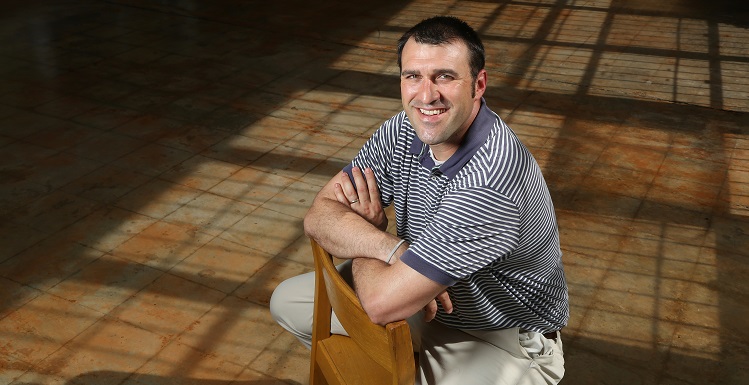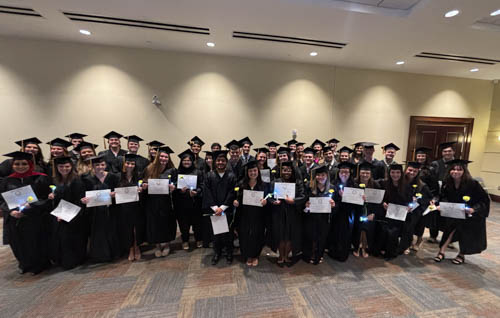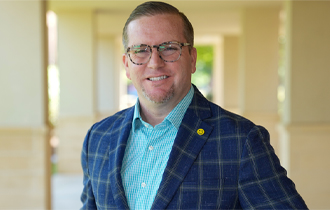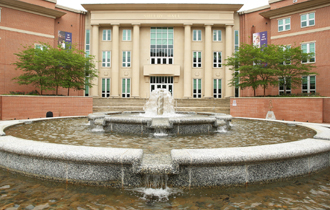Matt Spivey: Teacher, Coach and Neighbor
Posted on May 16, 2016

There was a point in his life when Matt Spivey felt he needed more focus.
“I kind of felt spread out in my life,” said Spivey, gesturing with his hands. “My church was over here, my work was over here, I lived over here. It was all disjointed.”
So Spivey left his job as a teacher and coach at Alma Bryant High School in south Mobile County, took a teaching position at Chastang Middle School and eventually moved his family to the Trinity Gardens neighborhood in north central Mobile. His home, church – Trinity Family – and school are now within five blocks of each other.
A 2001 graduate of the University of South Alabama with a degree in secondary education, Spivey was a veteran educator by the time he arrived at Elizabeth S. Chastang Middle School as a seventh grade social studies teacher. Yet the job, at a middle school in a disadvantaged neighborhood, felt brand new in the worst ways.
“Year 1 was tough. I had taught for 10 years, and I thought I had a handle on this teaching thing,” said Spivey. “I felt like a first-year teacher all over again.”
Five years later, Spivey is still settling in and building respect as a teacher and a neighbor. Speaking with a visitor in his classroom, it’s clear he is uncomfortable of attention shown his way. Spivey was selected as one of Mobile Bay magazine’s “40 under Forty,” an annual feature focusing on young leaders, but he is quick to shift accolades to his co-workers.
“I know my situation is probably unique because of my decisions, but I’m surrounded by some wonderful people.” he said.
Spivey, or Coach Spivey as some of his students call him – he coaches basketball at Chastang – said he’s always been drawn to working with society’s marginalized. His purpose is rooted in his faith, and in growing up in Montgomery, Spivey said, he saw the historical legacy of injustice. In addition, Spivey said sports gave him the opportunity to cross the racial, cultural and economic lines typically drawn in life.
Most days, Spivey walks to school from his home, where he and his wife are raising three children. Each child goes to public school, a magnet school. It was important, Spivey said, that his children were afforded the same educational opportunities others had in the community.
On his short walk, as he makes his way down Main Street, Spivey passes the homes of three children who are in his homeroom. And as he nears the end of his walk, near Berkley Avenue, a new building comes into focus: The under-construction K-8 Chastang-Fournier School.
The $15 million building will replace the aging Chastang Middle School.
The family’s decision to put roots in Trinity Gardens gives Spivey credibility he would not otherwise have, said Sonya Floyd, Chastang’s principal. That, she said, is especially important in his connection with students’ parents. “Mr. Spivey is part of the community,” she said.
For his part, Spivey is careful not to overstate that relationship. “I’m a foster child right now, working toward adoption,” he joked.
Still, that his students and parents see him in the neighborhood sends a message, Spivey concedes.
“They know that I’m going to be here tomorrow. I’m not going anywhere. I’m invested,” he said. “If I get on a kid, call a parent, write them up, I’m going to be back tomorrow. You’re not going to run me off.”
How Spivey measures his impact, no matter his tenure, is complex. Asked about gauging success and what that looks like, Spivey was restrained.
“That’s a relative term,” Spivey said. “I have to be careful on how I frame success or it can be frustrating.”
While a common idiom is a reminder to see the forest through the trees, Spivey takes the opposite approach. He focuses on what’s in front of him. “I’ve got to see the tree.”
So Spivey looks at short-term wins – a struggling student scores well on a test, or nails a question in class – while working for long-term outcomes. He wants to see his students become caring parents, hard-working employees and engaged citizens.
Spivey said that living, working and worshiping in Trinity Gardens is not about offering stability to those whose lives may have less security. “It’s about being a faithful presence,” he said.
“I want to be a …,” Spivey said, pausing, “neighbor.”
Archive Search
Latest University News
-

USA Launches New Hospitality and Tourism Concentrations
Global leadership and events marketing and management concentrations w...
April 17, 2024 -

Mortar Board Receives National Award, Initiates New Members
South's chapter of Mortar Board has received the Ruth Weimer Mount Cha...
April 17, 2024 -

USA Administrator Named as Faculty at National Institute
Dr. Mike Wilkinson has been chosen as a faculty member for 2024 New Pr...
April 16, 2024 -

South Earns National Designation for Cybersecurity Research
USA's School of Computing awarded a designation as a Center of Academi...
April 16, 2024


